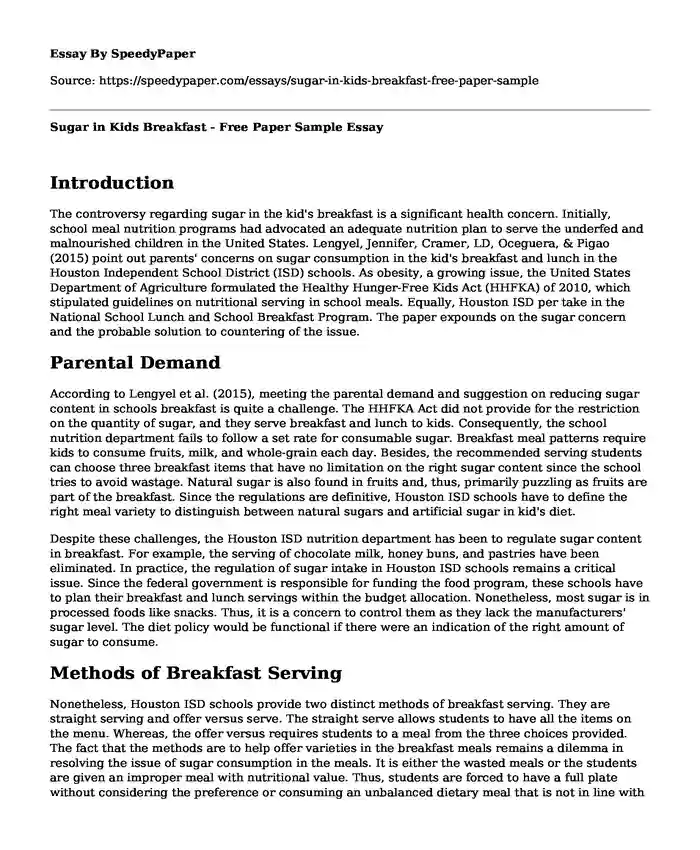
| Type of paper: | Essay |
| Categories: | School Healthcare Child development Nutrition |
| Pages: | 3 |
| Wordcount: | 671 words |
Introduction
The controversy regarding sugar in the kid's breakfast is a significant health concern. Initially, school meal nutrition programs had advocated an adequate nutrition plan to serve the underfed and malnourished children in the United States. Lengyel, Jennifer, Cramer, LD, Oceguera, & Pigao (2015) point out parents' concerns on sugar consumption in the kid's breakfast and lunch in the Houston Independent School District (ISD) schools. As obesity, a growing issue, the United States Department of Agriculture formulated the Healthy Hunger-Free Kids Act (HHFKA) of 2010, which stipulated guidelines on nutritional serving in school meals. Equally, Houston ISD per take in the National School Lunch and School Breakfast Program. The paper expounds on the sugar concern and the probable solution to countering of the issue.
Parental Demand
According to Lengyel et al. (2015), meeting the parental demand and suggestion on reducing sugar content in schools breakfast is quite a challenge. The HHFKA Act did not provide for the restriction on the quantity of sugar, and they serve breakfast and lunch to kids. Consequently, the school nutrition department fails to follow a set rate for consumable sugar. Breakfast meal patterns require kids to consume fruits, milk, and whole-grain each day. Besides, the recommended serving students can choose three breakfast items that have no limitation on the right sugar content since the school tries to avoid wastage. Natural sugar is also found in fruits and, thus, primarily puzzling as fruits are part of the breakfast. Since the regulations are definitive, Houston ISD schools have to define the right meal variety to distinguish between natural sugars and artificial sugar in kid's diet.
Despite these challenges, the Houston ISD nutrition department has been to regulate sugar content in breakfast. For example, the serving of chocolate milk, honey buns, and pastries have been eliminated. In practice, the regulation of sugar intake in Houston ISD schools remains a critical issue. Since the federal government is responsible for funding the food program, these schools have to plan their breakfast and lunch servings within the budget allocation. Nonetheless, most sugar is in processed foods like snacks. Thus, it is a concern to control them as they lack the manufacturers' sugar level. The diet policy would be functional if there were an indication of the right amount of sugar to consume.
Methods of Breakfast Serving
Nonetheless, Houston ISD schools provide two distinct methods of breakfast serving. They are straight serving and offer versus serve. The straight serve allows students to have all the items on the menu. Whereas, the offer versus requires students to a meal from the three choices provided. The fact that the methods are to help offer varieties in the breakfast meals remains a dilemma in resolving the issue of sugar consumption in the meals. It is either the wasted meals or the students are given an improper meal with nutritional value. Thus, students are forced to have a full plate without considering the preference or consuming an unbalanced dietary meal that is not in line with HHFKA guidelines. This means that the nutritional value reported is not the actual value since it is based on what the students receive. Parents would obtain a piece of accurate information on the number of sugars their children consume while at school.
Conclusion
In conclusion, Houston ISD Schools face a significant challenge in providing a controlled sugar meal to students. The large schools struggle with providing a limited variety due to food shortage and lack of financial support. The schools strain to meet USDA requirements while still providing a nutritional value intake. From the discussion, it is ideal for enacting a provision for the right amount of sugar to consume during breakfast and lunch. Also, there is a need to arrange a suitable nutritional program within the given budget.
Reference
Lengyel, M. S., Jennifer, G., Cramer, R. D. N., LD, N., Oceguera, M. S., & Pigao MA, L. (2015). Sugar In School Breakfasts: A School District's Perspective. Journal of Applied Research on Children: Informing Policy for Children at Risk, 6(2), 7.
Cite this page
Sugar in Kids Breakfast - Free Paper Sample. (2023, Nov 24). Retrieved from https://speedypaper.net/essays/sugar-in-kids-breakfast-free-paper-sample
Request Removal
If you are the original author of this essay and no longer wish to have it published on the SpeedyPaper website, please click below to request its removal:
- Free Essay on the Public Education System in the United States
- Free Paper: Aligning the Enrolment of Students with Placement Opportunities by Universities in Rural Pennsylvania
- Paper Example. Supervised Drug Injections Sites: A Positive Force
- Paper Example. Washington D.C. Public Schools
- Free Essay Sample on A Geriatric Patient
- Free Paper Sample on Risk Evaluation and Strategies
- What to Know About Type 1 Diabetes Mellitus - Essay Sample
Popular categories




